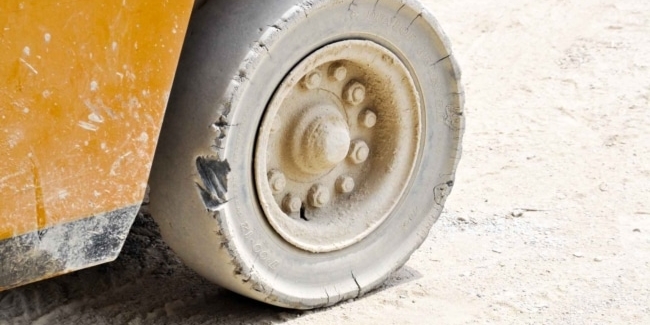News / Blog
Fast and Easy Ways to Reduce Forklift Tyre Wear

First signs of Forklift Tyre Wear
If your forklifts aren’t running well, it is going to impact how smoothly your business runs. Like any vehicle, a forklift requires regular maintenance to be kept in good working order. Tyre wear happens gradually over time.
One of the things that are often overlooked in a forklift fleet is the tyre conditions - if you have been neglecting your tyres until now, fear not - here is everything you need to know about your forklift tyres.
Pneumatic Tyres Warning Signs
If you can see any cuts, visible cord or frayed cord piles, this is a sign you need to replace the tyres as soon as possible. These cuts - no matter the size, can cause sudden air loss.
If there is a noticeable reduction in the tyre tread, also known as balding on the tyre, these also need to be replaced. Some tyre types bald faster than others - so regular inspection is essential.
The tyre’s inflation is also a critical point; an over-inflated tyre will cause instability in the forklift. A tear in the tyre happens when it meets sharp objects on the floor - this will cause air to escape quickly, and the impending imbalance is perilous.
Press-on Band Tyres Warning Signs
Press-on Band tyres (also known as cushion tyres) wear more slowly than some other tyre options, but there are still signs that you can look for.
Flat spots on the tyres are caused by tyre spinning, misalignment or skidding. You can spot flat areas because they will be slightly balder than the rest of the tyre.
Most press-on tyres have a 50% wear line; this means regular maintenance is even easier. Once the 50% line and the tyre meet, they need to be replaced.
Common causes and solutions to Forklift Tyre Wear
Overloading of Forklifts
One of the quickest ways to cause damage to your forklift tyres is to overload the vehicle.
Overloading of the forklift causes a shift in the weight distribution, and the tyres will carry the displaced weight.
The tyres will overheat and begin to crack - not only that, but it increases the chance of tipping over.
Driving Habits
One of the critical things is the training of your forklift staff.
They should have a solid understanding of the machinery they are using and get into the habit of checking the tyres before starting work.
The flat spots mentioned above can be caused by operators driving and turning at speed resulting in damage to the tyres.
Uncleaned Floors (Debris & Clutter)
The condition of the floor will also have an impact.
Where possible, keep the yard and floor clear of debris as typically debris will cause the tyre a lot of wear and tear.
Encourage drivers to avoid potholes and areas with debris where possible. Some floor debris is not that much of a problem for solid rubber tyres, but it still should be avoided for longevity.

Replacing your Forklift Tyres
Your tyres can be replaced with speed and precision, and it pays to seek advice on the best option for your business.
Solid Rubber Tyres
This type of tyre is exactly as they sound; they are the solid rubber version of the pneumatic tyres talked about above. They are incredibly durable and cannot be deflated or punctured.
These puncture-resistant tyres are often popular choices for rugged flooring in construction and industries alike.
Press-on Band Tyres
These tyres are constructed of heavy rubber and moulded to a steel band. You can get both smooth or traction tyres of this type.
Press-on band or cushion tyres are suited to smooth surfaces and indoors. Press-on tyres are solid and hard-wearing, and they are also capable of bearing loads much more significant than some other tyres.
Final Thoughts
Time is money when it comes to replacing your forklift wheels, so you need to work with a company that appreciates that. Get your forklift fleet back on the ground in no time at all. Every business has different requirements, so a bespoke wheel solution is the most convenient option to give your business exactly what it needs in terms of tyre replacement.
Which service can give you the fastest turn around? Click here to read about the differences between Press-On Tyres and Solid Pneumatic Tyres.
Complete industrial wheel solutions - all in one place
For more information, get in touch today on 0121 448 4900. Alternatively, to request a call-back - fill out the contact form below.